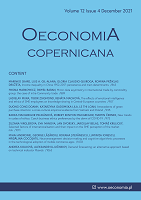Selected factors of internationalisation and their impact on the SME perception of the market risk
Selected factors of internationalisation and their impact on the SME perception of the market risk
Author(s): Zuzana Virglerová, Eva Ivanová, Ján Dvorský, Jaroslav Belas, Tomáš KrulickýSubject(s): Business Economy / Management, Economic policy, International relations/trade, Fiscal Politics / Budgeting
Published by: Instytut Badań Gospodarczych
Keywords: internationalisation; market risk; small and medium-sized enterprises; the Visegrad Four;
Summary/Abstract: Research background: Internationalisation of entrepreneurial activities provides an ample opportunity for the growth and sustainability of small and medium-sized enterprises (SMEs). When making their business activities international, SMEs are facing various obstacles. Investigating the key factors of internationalisation and their impact on SME decision making constitutes a key factor of the research work. Purpose of the article: The main purpose of the paper is to examine the impact of selected factors of SME internationalisation on the positive perception of the market risk. Higher export costs, differences in legal environment, taxes, and linguistic and cultural differences were set to be the significant factors influencing the positive perception of the market risk. Bearing the main purpose in mind, the Visegrad Four (V4 ? Czech Republic, Slovakia, Poland, Hungary) were examined. Methods: The questionnaire in mother tongue of each country in online and paper form was used. The questionnaire consists of 77 questions divided into several sections. Likert five-point scale was used to allow the respondents to express their opinion. In total, 1585 responses were completed. A regression analysis was used to verify the statistical significance of the independent variables and to quantify the causal relationships (determining the direction and strength of the effect) on the dependent variable. As the variables are of one metric, a linear regression model (LRM) was selected to validate the hypothesis. Findings & value added: The internationalisation of SME activities brings along many risks and barriers that SMEs need to overcome if they want to enter international markets. Many SMEs consider the barriers and restrictions to enter foreign markets to be severe. Therefore, they decide to do their business domestically. It was established in the research that only 30.2% of the respondents expanded their business activities internationally. The biggest impact on the positive assessment of the market risk was found to have linguistic and cultural differences. They do not have a negative effect on the positive perception of the market risk, so they do not hinder SMEs in their international expansion. The second most important was the factor of the export costs. The factor of possible increased costs is quite important for SMEs in making their decisions whether to expand internationally or not. This factor also shapes a positive approach to assessing the market risk by SMEs. In the research, SMEs confirmed that potential higher costs do not represent a major barrier for them in shaping their attitudes towards the market risk. The remaining factors being analysed, namely differences in legal environment and taxes, did not have a significant impact on the positive assessment of the market risk internationally. The practical implications can be found in new information about market risk in process of internationalisation provided from four selected countries.
Journal: Oeconomia Copernicana
- Issue Year: 12/2021
- Issue No: 4
- Page Range: 1011-1032
- Page Count: 22
- Language: English

